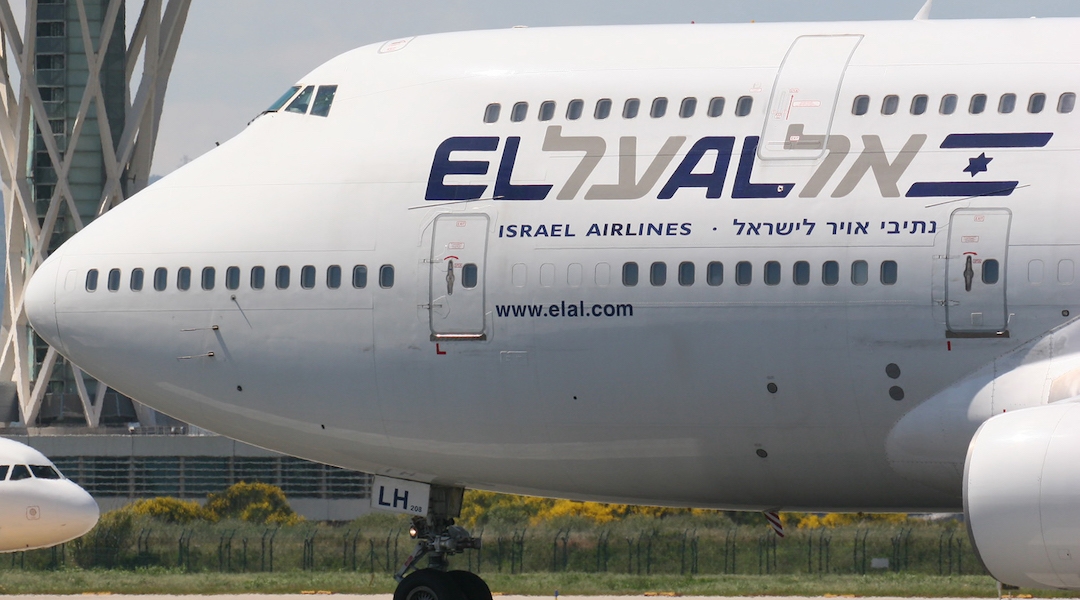Cost of shipping donated gear to Israel quadrupling as El Al ends Oct. 7 cargo discount
Since Oct. 7, Israel’s national airline has charged $50 per duffel of donated gear. The new price will be $200

Duffle bags full of donated equipment organized by Bergen County Lev Echad are laid out for transport to Israel at Newark Liberty International Airport, April 10, 2024 (Courtesy of Bergen County Lev Echad)
El Al, Israel’s national airline, is ending a discount program for baggage containing donations that was created soon after Oct. 7 amid widespread shortages of military and medical equipment.
The company says it made the decision because other cargo transport options that were shut down when the war began have resumed and because the need for donations has decreased as the military’s purchasing has caught up.
“On Oct. 7, we understood there’s a major national effort, and we were also the only ones still offering service to the United States,” Shira Kesselgross, El Al’s head of corporate communications, told the Jewish Telegraphic Agency. “There were a lot of donations at first, but, thank God, the army managed to stand on its own two feet and started supplying itself. We saw demand drop dramatically so we returned to our normal policy.”
After June 15, charities sending duffel bags to Israel will be required to pay $200 per bag, instead of the discounted rate of $50.
El Al has delivered tens of thousands of bags under the program, according to Kesselgross. The weight of the bags adds to a flight’s fuel costs and the bags take up space the airlines could otherwise sell to cargo customers.
“$50 was a symbolic price to cover some costs,” she said. “We weren’t making money off this program.”
The airline’s view that the need for donations has dropped off reflects the official position of the Israeli military, which says that there are no shortages of equipment.
Battlefield commanders and logistics officers say, however, that the official army line is false and that many combat soldiers are still stuck with subpar helmets and lack items like rifle scopes.
Charities collecting donations in the United States and civilian volunteers in Israel say they continue to field many requests from soldiers daily but acknowledge that they are delivering less equipment as a flood of donations from Jews in the Diaspora has slowed over time.

An El Al plane in 2013. (Wikimedia Commons)
Bergen County Lev Echad, a New Jersey charity, estimates it has sent more than 11,000 duffel bags to Israel since Oct. 7, according to Brian Nave, a volunteer with the group.
The group still sends 20 to 30 bags a week, which represents a significant slowdown from earlier months, Nave said, but he added that items it is sending such as drones and other electronics tend to be more expensive.
Nave said he was disappointed in El Al’s decision but is loath to criticize the airline.
“It’s going to make everything more expensive, but it’s understandable,” he said. “I don’t want to get pissed at them — they have been our partners. But it’s going to cost the Jewish people more money.”
Israel remains in a state of war in Gaza but has reduced troop deployment significantly after calling up hundreds of thousands of reservists. Meanwhile, tensions in the north of the country remain high as Israel exchanges fire with Hezbollah, which has been flying rockets across the border from Lebanon.
El Al is watching the security situation and could reinstate a discount program in the case of military escalation, Kesselgross said.
“If we suddenly see a new military need because of a major new military campaign in one arena or another, we are prepared to return to an emergency discount program,” she said.
This article originally appeared on JTA.org.
















